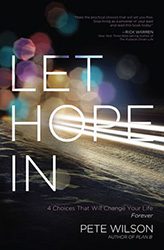Assistant Professor of Language, Literature, and Communication at Elizabeth City State University, NC
Nashville megachurch pastor Pete Wilson’s most recent book—Let Hope In: 4 Choices That Will Change Your Life Forever (Thomas Nelson 2013, $15.99)—is among the latest additions to an ever-expanding pantheon of works by Christian writers on the subject of hope. A brief scan of my own personal collection reveals some of the classics on this subject that have touched me most deeply: N.T. Wright’s Surprised by Hope, Josef Pieper’s treatise “On Hope,” Jürgen Moltmann’s Theology of Hope, C.S. Lewis’s chapter on Hope in Mere Christianity, and Billy Graham’s The Reason for my Hope are all among my most treasured. Hope—a concept and emotion so closely tied to the heart of the Gospel message—is a subject that the greatest of Christian writers have examined, explored, and attempted to explain, capture, theologize and philosophize for centuries. So as I cracked open Wilson’s book and began to read, I focused myself on asking: What new here do we have to learn? What revelation will come from these pages? How does this particular exegesis of hope fit into the canon of great pastoral, missional, and theological texts on such an essential Christian topic?
One of the most immediately attractive qualities of Let Hope In is Wilson’s colloquial and personable approach. He speaks simply, shares anecdotes from his own life as a father and husband, and doesn’t posture: he positions himself as one on the journey to understand and discover hope with us rather than one already arrived, project completed. The logic of Wilson’s approach is also very simple: he offers the reader four choices which, he argues, if responded to appropriately, lead to the sort of everlasting, abiding hope we all long for. The choices are:
(1) Do we choose to let negative events and feelings from our past continue to impact our present, or do we transform them?
(2) Do we accept our brokenness, or do we reject our weakness and flaws, attempting to hide or ignore them?
(3) Do we choose to trust God with our lives on a spiritual and internal level, or do we choose to please him externally, presenting ourselves as “well” publically while wasting away spiritually?
(4) Do we choose to use our freedom as Christians to lead others to freedom, or do we choose to allow the hurt inflicted on us continue to hurt those we interact with?
The “right” response is of course obvious in each case, and Wilson’s chapters are peppered with memorable, quotable, tweetable one-liners to reinforce his points:
“Once you let hope in, you have a responsibility—and often a desire—to then let that hope out.” (70)
“Focusing on sinning less doesn’t guarantee you will love more, but focusing on loving more will always guarantee that you will sin less.” (180)
“God’s main purpose for you is not what you do. It’s who you become.” (125)
While each choice we must make to let hope in is always supported by biblical narratives characterizing incredible moments when God brought hope to the most hopeless of situations, I must admit that I often found myself longing for even more scriptural references and more theological depth. I was surprised, for example, to find little attention given to the role of eternal life and heaven as sources of a Christian’s hope, and I resisted what at times seemed an oversimplification of how hope might arrive in a Christian’s heart. What I have loved about writing like that by Lewis and Wright on hope is their acknowledgment of the real miracle and mystery of Christian hope: how truly undeserving of any hope humanity is and how incredible that it was granted to us freely and fully. All four of the choices Wilson offers are certainly good and valuable to make and perfectly in line with Scripture; however, the rhetoric of simplification—just make these four choices and hope will come!—struck me as somewhat reductive of the phenomenon of Christian hope and at times somewhat uncomfortably in line with an American ethos of self-empowerment and the desire for simple and fast results. Especially reading this book during the recent Advent season, I found myself acutely attune to how powerful, revolutionary, and miraculous the moment when Hope entered the world really was, and I searched Wilsons’ words for a parallel understanding of how non-reductive the message of hope is.
Nevertheless, Christian readers struggling with regret or who feel that a troubled past is impacting how they view God and His message will find gems of wisdom in this book. And I can imagine this book working very well for a small group, accompanied by dialogue that could supplement the text with additional scriptural context and theological discussion. Indeed, where Wilson is at his best is when he is not offering suggestions of things for us to do or choose but when he is reminding us of who we already are in Christ (beloved, completely forgiven, valuable) and of how truly great the God we serve is (capable, faithful, powerful, loving). Moments when Wilson placed the Gospel before his readers in its most simple and pure form struck me as the most powerful reminder of why we should hope and how revolutionary the moment is when God does at last release this hope into our hearts.
Read an excerpt from Let Hope In at the Patheos Book Club here!
 Amber M. Stamper holds a Ph.D. in English (Rhetoric and Composition) and is an Assistant Professor of Language, Literature, and Communication at Elizabeth City State University in North Carolina. Her research and publications center on religious rhetoric and communication, especially issues of Christian evangelism and the digital church.
Amber M. Stamper holds a Ph.D. in English (Rhetoric and Composition) and is an Assistant Professor of Language, Literature, and Communication at Elizabeth City State University in North Carolina. Her research and publications center on religious rhetoric and communication, especially issues of Christian evangelism and the digital church.














